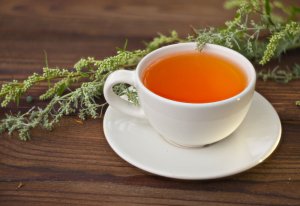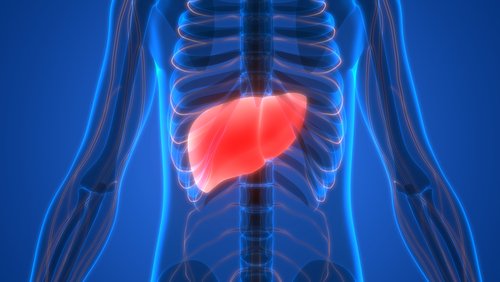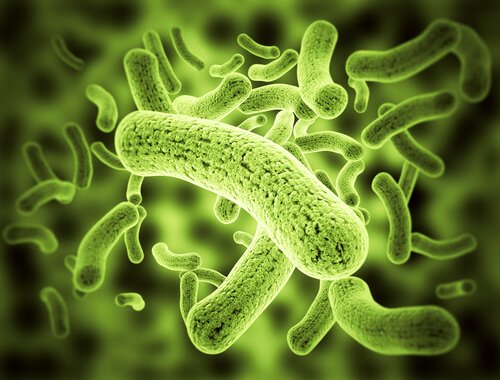Discover the Surprising Health Benefits of Wormwood

Wormwood is a sour medicinal plant that stands out because of its digestive, anti-inflammatory, and toning properties, in addition to many more. It’s important to know that, despite its flavor, the benefits of wormwood for your health are countless.
Discover all of the healing properties that wormwood has in this article!
What is Wormwood?
Wormwood, whose Latin name Artemisia absinthium, is a medicinal plant. It’s also known as yerba santa or artemisia. It’s originally from the temperate areas of Europe, Asia, and northern Africa.
Some countries are familiar with this plant because they use it to make absinth, a drink with a high alcohol content that began in Switzerland. However, it became popular with French artists at the end of the 19th century.
This plant belongs to the daisy family and has known medicinal value since ancient times.
Actually, some cases of belladonna poisoning can even be cured with wormwood tea.
Also read: Try a Medicinal Plant Liver Detox
Health Benefits of wormwood
Digestive

On a digestive level, wormwood fulfills two primary functions:
- In the first place, it helps many kinds of problems. This includes pain, flatulence, diarrhea, and vomiting, However, it’s not recommended to use to treat heartburn or hiatal hernia.
- Also, it’s a digestive cleanser. Thus, it stimulates your appetite and increases the secretion of gastric juices. This is great for people without appetites or with slow-moving digestion. It’s also good for after a period of convalescence.
Liver

When your liver function is weakened, you may notice fatigue, difficulty processing fats, vision problems, hair loss, or the appearance of premature crow’s feet.
- Wormwood decongests your liver and stimulates it’s function, as well as the gallbladder.
- In general, sour medicinal plants, like boldo and artichoke, stimulate the function of the liver.
It’s Purifying
Thanks to its hepatic properties, wormwood is an excellent option to detoxify your body. After all, the liver is in charge of cleaning your blood and eliminating toxic substances.
So, we recommend drinking a cup of wormwood tea every 3-6 months.
Intestinal Parasites

The healing power of wormwood has the capability to eliminate a large variety of worms or parasites. These are common in the majority of people. However, many don’t know they have them.
- For this reason, it’s good to do a wormwood cleanse at least once per year, especially if you have pets in the house.
Aphrodisiac

This medicinal plant has aphrodisiac properties that can increase the libido in both men and women.
Menstrual Issues
Wormwood is excellent for women that suffer from irregular periods and other menstruation problems.
This plant has the power to help regulate cycles as well as cause menstruation in the case of amenorrhea.
Pain

The topical application of wormwood can ease stomach pain, joint pain, or molar pain.
How Do You Use It?
The simplest, cheapest and most effective way to take drink wormwood is in teas, and for only a short time:
- If it’s a one-time pain, you can drink two infusions throughout the day.
- If it’s a chronic pain or you want to do a detoxification, we recommend you drink two infusions every day for a week, rest for a week and repeat drinking it again for 6 days.
This way, you can promote liver function and combat intestinal parasites.
- To apply topically, apply a towel soaked in wormwood tea in the abdominal area to calm digestive problems or pain. This is also a good option for children.
As with all infusions of sour plants, wormwood should never be boiled. You only add it to already hot water.
Contraindications
- Medicinal plants can also be harmful if taken in excess or without ample knowledge, so we always recommend that you consult a doctor or naturopath.
- Consuming wormwood is not recommended for pregnant women and people with stomach ulcers.
- You should not abuse wormwood and should only take the indicated dosage that was mentioned earlier.
All cited sources were thoroughly reviewed by our team to ensure their quality, reliability, currency, and validity. The bibliography of this article was considered reliable and of academic or scientific accuracy.
- Lachenmeier, D. W. (2010). Wormwood (Artemisia absinthium L.)-A curious plant with both neurotoxic and neuroprotective properties? Journal of Ethnopharmacology. https://doi.org/10.1016/j.jep.2010.05.062
- Krishna, S., Bustamante, L., Haynes, R. K., & Staines, H. M. (2008). Artemisinins: their growing importance in medicine. Trends in Pharmacological Sciences. https://doi.org/10.1016/j.tips.2008.07.004
- Patocka, J., & Plucar, B. (2003). Pharmacology and toxicology of absinthe. Journal of Applied Biomedicine.
- Alvarez, L., & Quispe, A. (2010). Efecto Antiparasitario de la Infusion de Ajenjo (Artemisia absinthium L.) en Niños de Edad Escolar. Ucebol.
This text is provided for informational purposes only and does not replace consultation with a professional. If in doubt, consult your specialist.








